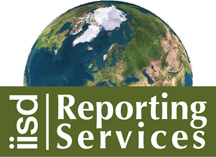News * Abou us * the ENB team * DONATE * Activities * Search * IISD RS home * IISD.org * RSS * What is RSS? * Links |
|
MEA Bulletin
30 January 2007 LAW AND SUSTAINABLE DEVELOPMENT AT FAO By Elisa Morgera, FAO Legal Office, Development Law Service Full article Legal developments at the international level in the area of environment and natural resources often call for national legislative change. The Legal Office of the Food and Agriculture Organization of the United Nations (FAO) serves as a focal point for promoting the design of appropriate and workable legal frameworks for the sustainable development of natural resources. To this end, the Legal Office, through its Development Law Service (LEGN), undertakes a number of activities, ranging from advisory services for the development of national law and for the conclusion of regional and international agreements, to legal research and the collection and systematization of legal information related to the sustainable management of natural resources. 1. Assistance in national legislation and capacity building FAO’s Legal Office provides governments legal advisory services on food safety, plant and animal genetic resources, plant protection, seeds, pesticides, animal health, land tenure, biotechnology, bioenergy, fisheries, forestry, water, wildlife and national parks, as well as agricultural trade and related economic and institutional reforms. FAO’s legal assistance typically includes a systematic analysis of the legal framework, recommendations for addressing weaknesses and constraints, advice on institutional structures and compliance with international law, and assistance in the drafting of new legal instruments. Fundamental elements of these advisory projects are capacity building through participatory training of national officials and consultants, and broad-based involvement of stakeholders, including government and non-governmental institutions, central and local authorities, community and private sector actors. Another salient characteristic of FAO’s legal assistance is the close cooperation with the relevant in-house technical services, thus ensuring that the legal work is informed by scientific, technical and policy considerations. Current legal advisory projects include 70 countries from every region of the world. One success story was, for instance, the assistance provided in 2004–2005 to the governments of Kazakhstan, Kyrgyzstan and Uzbekistan in reviewing, revising and harmonizing their legislation on protected areas, which contributed to creating suitable, updated and coordinated legal frameworks for the sustainable conservation and management of ecosystems, natural habitats and biological diversity, at national level as well as region-wide. 2. Assistance in regional and international agreements The Legal Office also contributes to the formulation of international and regional instruments concerning natural resources and the environment. The most notable examples with global application are the FAO Code of Conduct for Responsible Fisheries, the International Plant Protection Convention and the International Treaty on Plant Genetic Resources for Food and Agriculture. An example at the sub-regional level was FAO’s assistance to Algeria, Libya and Tunisia leading to the creation of a “consultation mechanism” for the management and development of groundwater resources in the North-Western Sahara Aquifer System, which is common to the three countries. 3. Legal information The Legal Office maintains updated legislative information on food, agriculture and natural resources, through these freely accessible online databases:
Furthermore, the FAO Legal Office collaborates with worldwide institutions at various levels. For example, FAO signed a Partnership Agreement with the United Nations Environment Programme (UNEP) and IUCN-The World Conservation Union in 2001. Recognizing FAOLEX’s achievements in providing information on food and agricultural law as well as environmental law, UNEP, IUCN and FAO agreed to consolidate their efforts in order to facilitate access to information on natural resources legislation, particularly in developing countries and countries with economies in transition. The joint environmental law information service (ECOLEX) contains references to and the texts of international treaties, European Union legislation and national legislation, soft law instruments, policy and law literature and judicial decisions in the field of the environment (http://www.ecolex.org). 4. Research and studies The FAO Legal Office also contributes to global debates on development, environment and law through participation in international meetings and publications. The Development Law Service maintains a Legislative Studies series (http://www.fao.org/Legal/pub-e.htm), the most recent of which discuss perspectives on law and gender, mountains, coastal zone management and genetically modified organisms (forthcoming in 2007). In addition, the Service posts FAO Legal Papers Online, articles and reports on comparative and international law topics relating to food policy, agriculture, rural development, biodiversity, environment and natural resource management (http://www.fao.org/Legal/prs-ol/paper-e.htm). The most recent papers concern the agriculture-related WTO agreements, responsible fisheries, and phytosanitary legislation. Through these activities and building on its years of comparative legislative experience, the FAO Legal Office is in a unique position to assist countries in engineering legislative changes in the law on food, agriculture and sustainable management of natural resources. The Office assists in developing national and local capacities to this end, analyzing emerging trends and disseminating best practices and lessons learnt to government officials, researchers, lawyers and all those interested in the law on sustainable development. For further information, please contact: DevLaw@fao.org |

